- Home
- Graham McNeill
02 - Empire Page 2
02 - Empire Read online
Page 2
Wolfgart waved his tankard at the hundreds of feasting tribesmen gathered around the long fire pit. Wild boasts and happy laughter passed back and forth, pipe music vied with songs of battle, and the rafters shook with the sound of great revelries.
“I mean, look around you, Pendrag!” cried Wolfgart. “All the tribes gathered here, under one roof and not fighting each other. For that alone, Sigmar deserves to be Emperor.”
“It is impressive,” agreed Pendrag, taking a refined sip of Tilean wine. King Siggurd had brought six barrels of the stuff, and Pendrag had acquired quite a taste for it.
“It’s more than impressive, it’s a damned miracle,” slurred Wolfgart, using his tankard arm to encompass the entire longhouse. “I mean, the Cherusens and Taleutens have been fighting over their border territories for longer than any of us have been alive, and here they are drinking together. Look over there… Thuringians swearing blood oaths with thems as used to be Teutogens! Bloody miracle is what it is, a bloody miracle.”
“Aye, it’s a miracle, but it’ll be a greater miracle if you’re able to walk in a straight line when the time comes to take the king’s march to the Oathstone.”
“Walk. Stagger. What’s the difference?” asked Wolfgart, lifting the ewer once again.
Pendrag reached over to restrain him from pouring another drink, and Wolfgart felt the cold metal of his friend’s silver hand. A Thuringian axe had taken three of Pendrag’s fingers during the Battle of the Berserker King, and Master Alaric of the dwarfs had fashioned the new gauntlet for him. Pendrag claimed that the mechanical fingers functioned as well as his old ones, but Wolfgart had never been able to get used to them.
“You will shame Maedbh if you cannot stand up,” pointed out Pendrag. “And do you really want that?”
Wolfgart stared hard at Pendrag for a moment before upending the ewer.
“Damn, but you always cut to the bone, friend,” he said, reaching instead for the largely untouched jug of water. “I slept with the horses for three days the last time I came home drunk.”
Wolfgart took several gulping draughts of water, rinsing his mouth of the taste of beer and spitting it over the straw-covered floor.
“Civilised as always,” said a voice beside Wolfgart as a warrior, armoured in iron plate painted a deep red lowered himself to sit next to him. “I thought Reikdorf was the light of civilisation in the world these days, and that the northerners were supposed to be the crude barbarians?”
“Ah, Redwane, how the young misunderstand the ways of their elders and betters,” said Wolfgart, smiling and throwing an arm around the White Wolf. Like Pendrag, Redwane’s copper-coloured hair was elaborately braided, and his handsome features were open and friendly. Some called them soft, but those who had seen Redwane fight knew that nothing could be further from the truth.
“In the south, it is a sign of good breeding to behave like a lout from time to time,” said Wolfgart.
“Then you are the most civilised man I know,” said Redwane, adjusting his wolfskin cloak around his shoulders, and setting down his hammer before lifting an empty mug.
Wolfgart laughed, and Pendrag poured Redwane a beer.
“Welcome, brother,” he said. “It is good to have you back in Reikdorf.”
“Aye, it’s been too long,” agreed Redwane. “Siggurdheim is a fine place, with cold beer and warm women, but I’m glad to be home.”
“How come he gets to drink beer, but I don’t?” demanded Wolfgart.
“Because Ulric has blessed me,” said Redwane, patting his flat stomach. “My guts are lined with trollhide, and, unlike you milksops, I’m able to consume more than a flagon before falling down dead drunk.”
“That sounds like a challenge to me,” said Wolfgart, reaching for the beer.
“Leave it,” ordered Pendrag. “Save it until after the coronation.”
Wolfgart shrugged and threw his hands up, saying, “Ulric deliver me from these mother hens, one of them barely seventeen summers!”
“How was your journey?” asked Pendrag, ignoring Wolfgart’s exasperation.
“Uneventful,” said the warrior, “more’s the pity. Since Black Fire the roads have been quiet, no bandits or greenskins to speak of. Even the forest beasts seem cowed.”
“Aye, it’s been a quiet year,” agreed Pendrag.
“Too quiet,” grumbled Wolfgart. “My sword’s getting rusty above the fireplace, and I’ve not killed a greenskin in two seasons.”
“Wasn’t that the point?” countered Pendrag. “All the years of war were to keep our lands safe and protected. Now we have done that, and you complain because you do not have to fight and risk your life?”
“I am a warrior,” said Wolfgart. “It’s what I know.”
“Maybe you can learn a new trade?” said Redwane, winking at Pendrag. “With the land safe and the forests being cleared for new settlements, Sigmar’s empire will need more farmers.”
“Me, a farmer? Don’t be foolish, boy. I think that southern air has rotted your brain if you think I’ll be a farmer. Just because we slaughtered the greenskins at the pass doesn’t mean they won’t be back. No, I’ll not be a farmer, Redwane. I’ll leave that to others, for this land will always have need of warriors.”
Redwane laughed.
“I expect you’re right,” he said. “You would make a terrible farmer.”
Wolfgart smiled and nodded. “You have the truth of it. I’ve not the patience to work the land. I fear I am more suited to ending life than bringing it forth.”
“That’s not what I hear,” said Redwane, elbowing Wolfgart in the ribs. “The talk is that you are to be a father in the spring.”
“Aye,” said Wolfgart, brightening at the mention of his virility. “Maedbh will bear me a strong son to carry on my name.”
“Or a daughter,” said Pendrag. “Asoborn women beget girls more often than not.”
“Pah, not on your life!” said Wolfgart. “With the strength of my seed, the boy will climb out himself, you mark my words.”
“We shall see in the spring, my friend,” said Redwane. “Whatever form your heir takes, I will help you wet its head in beer, and sing the songs of war through the night with you.”
“I’ll be happy to let you,” said Wolfgart, clasping the White Wolfs wrist.
Sigmar’s brother kings were waiting for him at the base of Warrior Hill, resplendent in robes of many colours and armour of the highest quality. Each carried a golden shield upon one arm, and a line of flaming brands was set in the ground before them. The firelight cast a warm glow about them, the most powerful warriors in the lands of men. Together they had saved their people from annihilation, and now they had gathered to bear witness to a singular event in the history of the world: the crowning of the first Emperor.
This night would seal their pact to preserve the safety of every man, woman and child in the empire. Sigmar loved them all, and mouthed a silent prayer of thanks to Ulric for the honour of standing shoulder to shoulder with such heroes.
King Krugar of the Taleutens, a broad-shouldered warrior in a gleaming hauberk of silver scale, stood at their centre, flanked by King Henroth of the Merogens and Markus of the Menogoths. Both southern kings were smiling, though Sigmar could see the great sorrows they carried. Their kingdoms had suffered terribly in the wars against the greenskins, and little more than a thousand of their people had survived the years of death.
Sigmar’s eyes were drawn next to Queen Freya of the Asoborns. The flame-haired queen was clad in shimmering mail that looked as though it had been woven from golden thread. A torque of bronze and silver encircled her graceful neck, and a winged crown of jewel-studded gold sat on her high brow. A cloak of vivid orange hung from her shoulders, but did little to conceal the smooth curve of her limbs and the sway of her hips as she turned to face him.
Sigmar felt himself responding to Freya’s primal beauty, recalling the night of passion that had sealed their union with a mixture of pleasure and remembered pain.
He quickly suppressed his feelings and concentrated on greeting the rest of his allies.
Next to the Asoborn Queen stood Adelhard of the Ostagoths, his drooping moustache waxed to gleaming points, and his chequered cloak of black and white echoing the trews and shirt he wore beneath it. Ostvarath, the sword of the Ostagoth kings, was sheathed at Adelhard’s side. Adelhard had offered to surrender this sword to Sigmar in return for his aid in battle against the orcs. Sigmar’s warriors had fought alongside the Ostagoths, but he had declined Adelhard’s sword, claiming that so mighty a weapon should remain with its king.
Aloysis of the Cherusens was a lean, hawk-faced man with dark hair tied in a long scalp-lock. In the manner of his fiercest warriors, he had shaved his beard and adorned his face with curling tattoos of blue and red, and his bright red cavalry cloak flapped in the wind. The laconic king give Sigmar a respectful nod.
King Aldred of the Endals wore a fur-lined robe of brown wool, edged in black and gold thread. The symbol of his kingship, the elf blade Ulfshard, was belted at his side, and Sigmar remembered Aldred’s father hurling the blade to him at Black Fire Pass. The weapon had saved Sigmar’s life, but Marbad had died moments later. Sigmar saw the bitter echoes of Marbad’s death in his son’s eyes.
The kilted warrior next to Aldred was King Wolfila of the Udose, a gruff king of reckless bravery and great warmth. His clansmen had fought the Norsii for many years, and his pale skin shone with a healthy glow in the torchlight. A great, basket-hilted claymore was sheathed over his shoulder, longer even than Wolfgart’s monstrous blade. Wolfila grinned like a loon, and his pleasure at the night’s events was clear.
Sigmar smiled to see that King Siggurd had outdone himself, appearing in a rich array of purple and blue robes, edged in ermine and bedecked in enough gold to make a dwarf’s eyes gleam with avarice.
Given his last observation, Sigmar was not surprised to see that King Kurgan Ironbeard of the dwarfs stood next to Siggurd, though his oldest ally wore almost as much gold as did the Brigundian king. Clad in a shirt of runic gold plate with silver steel pauldrons and a gold helmet, Kurgan seemed more like one of his people’s ancient gods than a mortal king. Alone of all the gathered kings, Kurgan’s weapon was bared, a mighty axe with two butterfly-winged blades enchanted with runes that shone with their own spectral light.
King Otwin of the Thuringians stood slightly apart from the others, though whether that was his choice or theirs was unclear. His crown was a mass of golden spikes hammered through the skin of his head, and he wore little more than a loincloth of dark iron mail and a cloak of deepest red. The Berserker King’s bare chest heaved, and Sigmar saw the wildroot juice staining his lips.
Myrsa of the Fauschlag Rock, dazzling in his armour of purest white, looked uncomfortable in the company of kings but, as the master of the northern marches, he had earned the right to be part of this fellowship. A long-handled warhammer was slung at Myrsa’s belt, but it was no imitation of Sigmar’s weapon, for this hammer was designed to be swung from the back of a charging steed.
Only one tribe was not represented, and Sigmar quelled his anger at the absence of the Jutone king. That was a reckoning for another day.
He squared his shoulders, and glanced round at Alfgeir, who gave a barely perceptible nod.
Sigmar took a deep breath and began to speak.
“Never before has this land borne witness to such a gathering of might,” he said, unhooking Ghal Maraz from his belt. “Even on the barren plain of Black Fire Pass we were not so proud, so strong or so mighty.”
Krugar of the Taleutens stepped from the ranks of kings and drew his sword, a curved cavalry sabre with a blade of brilliant blue steel.
“Have you honoured the dead, King Sigmar?” he asked. “Have you made offerings to the land and remembered those men from whence you came?”
“I have,” replied Sigmar.
“And are you ready to serve this land?” asked Siggurd.
“I am.”
“When the land is threatened, will you march to its defence?” demanded Henroth.
“I will,” said Sigmar, holding Ghal Maraz out before him.
“Then it’s to the Oathstone!” shouted Wolfila, swinging his enormous claymore from its scabbard. “Ar-Ulric awaits!”
—
Rise an Emperor
Sigmar led the kings from Warrior Hill into Reikdorf. Word of their coming had spread, and the city’s populace came out to greet them. Hundreds of people lined the streets, carrying torches to dispel the darkness, and cheering as the procession of kings passed. Warriors spilled from the longhouse, banging their swords on their shields as they came. Endal Pipers ran to the front of the procession and led the way to the Oathstone, their lilting music speaking to the heart and filling the blood with fire.
He saw Wolfgart and Pendrag in the crowd of warriors, and smiled at their joy. To have come so far and achieved so much was incredible, but Sigmar knew he could not have done it without his friends. What he and his sword-brothers symbolised was the empire in microcosm; individually men were strong, but together they were mighty.
The kings of the land marched alongside Sigmar with their heads held high and their weapons resting on their shoulders. Tribesmen from all across the empire yelled and whooped to see their kings so honoured.
Banners waved in the air in a dazzling array of rearing stallions, mailed fists, golden chariots and snarling wolves. Oaths and promises of fealty in a dozen different dialects were shouted as every warrior gathered offered his sword to the king of the Unberogen. As Sigmar watched their faces, ecstatic in the reflected glow of firelight, he felt the weight of their expectations settle upon his shoulders.
To have won this land was only the first part of his journey.
Now he had to keep it safe.
The procession wound its way through the cobbled streets of the city, past great halls, stone dwellings and timber-framed stables. Children in colourful tunics ran wild, playing with barking dogs, their innocent laughter a welcome counterpoint to the martial shouts of warriors.
The procession emerged into the open square on the river’s northern bank, where the sacred stone carried from the east in ages past by the first warriors of the Unberogen was set in the earth. This had been the centre of the original settlement of Reikdorf, back when it had been little more than a collection of wattle and daub huts huddled by the side of the river. The settlement had grown immeasurably since those long ago days, but its heart was ever this place.
The pipers peeled away, taking up positions beside Beorthyn’s forge. Sigmar smiled. The irascible old smith had been dead for ten years, yet the forge still bore his name.
Perhaps a thousand people filled the square, pressed against the buildings at the square’s perimeter. Torches were planted in a circle around the Oathstone, and a huge figure stood within the ring of firelight beside a vast cauldron of black iron.
Clad in wolfskin and glittering mail that shimmered with hoarfrost, the figure’s breath gusted from his mouth as though it were the darkest winter night instead of the last days of summer. He carried a staff of polished oak, hung with long fangs and topped with a wide axe blade that glittered like ice. His face was obscured by a wolf-skull mask, and a thick pelt of white wolfhide hung from his shoulders.
Taller and broader than any warrior Sigmar had ever seen, this was Ar-Ulric, the high priest of the god of battles and winter, a warrior who wandered the wilds with the snow and wind. Generations might pass without any sign of Ar-Ulric, for he had little to do with the affairs of mortals. Ulric was a god who expected his followers to fend for themselves. At his side were two enormous wolves, one with midnight-black fur, the other of purest white. Their fur stood erect, as though frozen, and their eyes were like smouldering coals.
The pipers ceased their music, and the warriors filling the city fell silent as Sigmar entered the circle of torches. His fellow kings took up positions around the circle as Sigmar stood before the enormous cauldron
. Dark water filled it, and ice had formed on the surface.
The wolves slowly padded forward and began circling Sigmar. Their fangs were bared and thick ropes of saliva drooled from their jaws. Ar-Ulric remained unmoving as the wolves growled and sniffed him. Sigmar felt the cold of their gaze upon him, knowing he was being judged by a power greater than that of mere beasts.
Cold waves radiated from the wolves, and their icy touch entered Sigmar’s bones. Endless winter swept through his flesh in a moment, as though his blood had turned instantly to ice. A vision of vast, unending tundra, eternally roamed by packs of slavering wolves, flashed into his mind. Sigmar glanced at his fellow kings gathered at the ring of torches. None appeared to be feeling the dreadful cold. The breath of Ulric touched only him.
The wolves completed their inspection, and the vision faded from Sigmar’s thoughts as they returned to their master’s side. Their orange eyes never left Sigmar, and he knew their gaze would always be upon him, no matter where the paths of fate led him.
Apparently satisfied with his wolves’ judgement, Ar-Ulric came around the cauldron to stand before him. Like the wolves, the high priest carried the chill of unending winter, and Sigmar saw that the blade of his axe was indeed formed from a jagged shard of ice.
Sigmar knelt before the priest of the wolf god, but kept his head held high. He honoured Ar-Ulric, but he would not show fear before him.
The mighty priest towered over him, a primal presence that spoke of devotion beyond measure and a life of battle in realms beyond mortal ken. Where Sigmar had served Ulric faithfully in battle, Ar-Ulric was the very embodiment of Ulric. This warrior’s power was enormous, and for him to emerge from the icy wilderness was a great honour.
“You seek Ulric’s blessing,” said Ar-Ulric, his voice hoarse, like a blast of winter wind and just as cold. “By what right do you think you are worthy of the lord of winter’s favour?”
“By right of battle,” said Sigmar, fighting to stop his teeth from chattering in the cold. “By my blood and sacrifice I have united my people. By such right, I claim dominion over the land, from the mountains to the seas, and all who dwell there.”

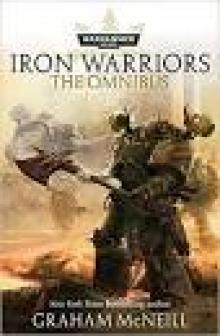 Iron Warriors - The Omnibus
Iron Warriors - The Omnibus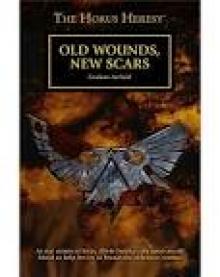 Old Wounds, New Scars
Old Wounds, New Scars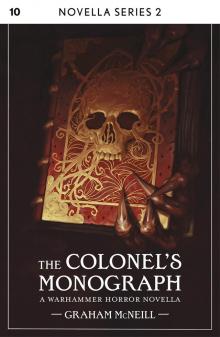 The Colonel's Monograph
The Colonel's Monograph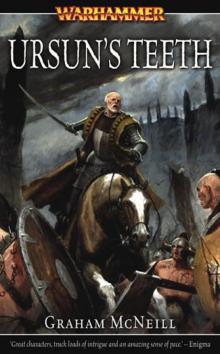 Ursuns Teeth
Ursuns Teeth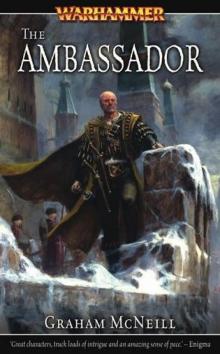 The Ambassador
The Ambassador![[Ultramarines 5] Courage and Honour - Graham McNeill Read online](http://i1.bookreadfree.com/i/03/12/[ultramarines_5]_courage_and_honour_-_graham_mcneill_preview.jpg) [Ultramarines 5] Courage and Honour - Graham McNeill
[Ultramarines 5] Courage and Honour - Graham McNeill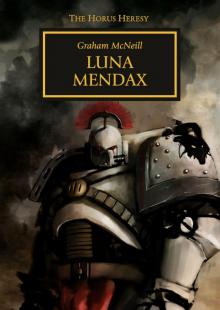 28a Luna Mendax
28a Luna Mendax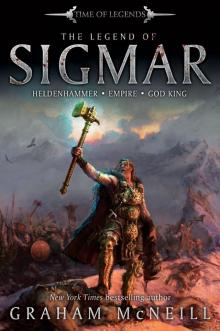 The Legend of Sigmar
The Legend of Sigmar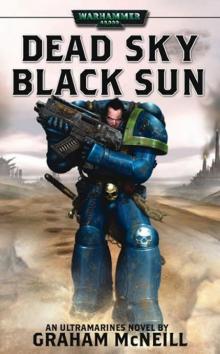 Warhammer - Ultramarines 03 - Dead Sky, Black Sun (McNeill, Graham)
Warhammer - Ultramarines 03 - Dead Sky, Black Sun (McNeill, Graham)![Warhammer - [The Ambassador Chronicles 01] - The Ambassador Read online](http://i1.bookreadfree.com/i/03/17/warhammer_-_[the_ambassador_chronicles_01]_-_the_ambassador_preview.jpg) Warhammer - [The Ambassador Chronicles 01] - The Ambassador
Warhammer - [The Ambassador Chronicles 01] - The Ambassador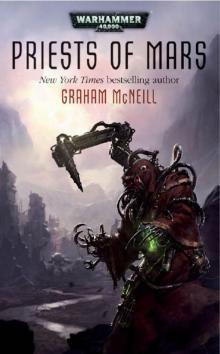 Priests of Mars
Priests of Mars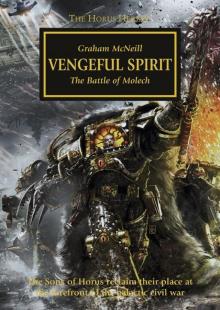 Vengeful Spirit
Vengeful Spirit![[Sigmar 03] - God King Read online](http://i1.bookreadfree.com/i/03/13/[sigmar_03]_-_god_king_preview.jpg) [Sigmar 03] - God King
[Sigmar 03] - God King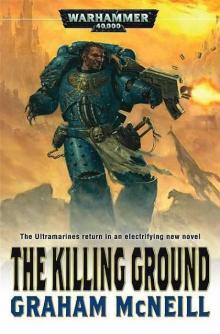 The Killing Ground
The Killing Ground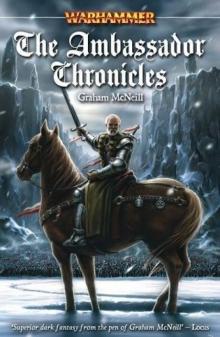 The Ambassador Chronicles
The Ambassador Chronicles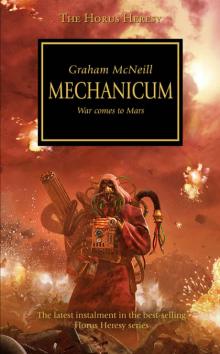 Mechanicum
Mechanicum![[Ulthuan 02] - Sons of Ellyrion Read online](http://i1.bookreadfree.com/i/03/14/[ulthuan_02]_-_sons_of_ellyrion_preview.jpg) [Ulthuan 02] - Sons of Ellyrion
[Ulthuan 02] - Sons of Ellyrion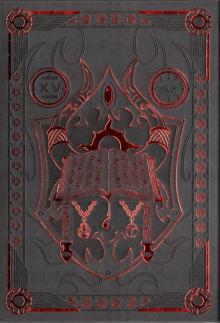 Magnus the Red: Master of Prospero
Magnus the Red: Master of Prospero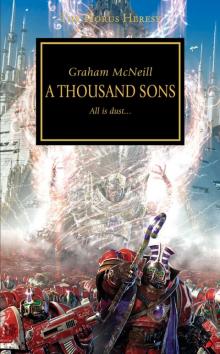 A Thousand Sons
A Thousand Sons![[Warhammer] - Guardians of the Forest Read online](http://i1.bookreadfree.com/i/03/18/[warhammer]_-_guardians_of_the_forest_preview.jpg) [Warhammer] - Guardians of the Forest
[Warhammer] - Guardians of the Forest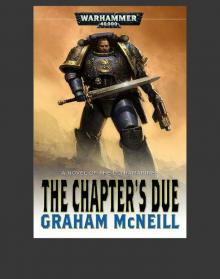 The Chapters Due
The Chapters Due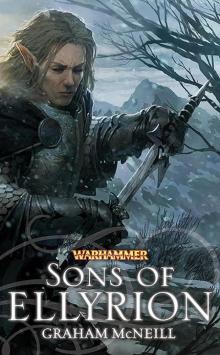 02 - Sons of Ellyrion
02 - Sons of Ellyrion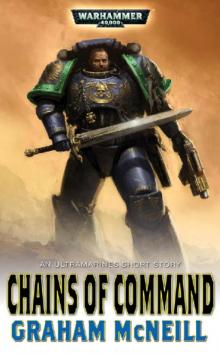 Chains Of Command
Chains Of Command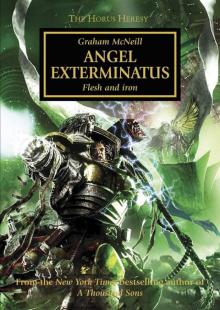 Angel Exterminatus
Angel Exterminatus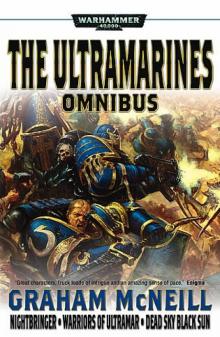 The Ultramarines Omnibus
The Ultramarines Omnibus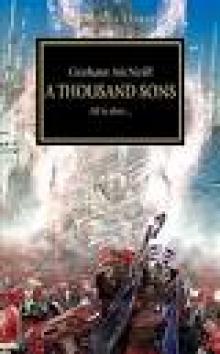 X Marks da Spot
X Marks da Spot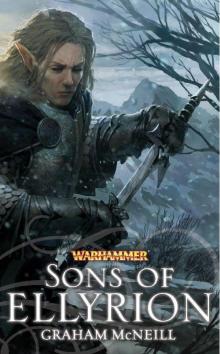 Sons of Ellyrion
Sons of Ellyrion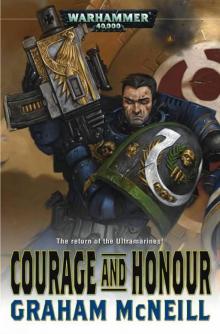 Courage And Honour
Courage And Honour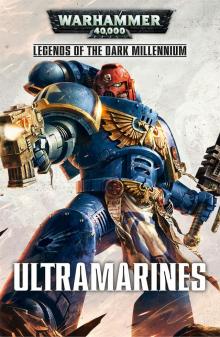 Ultramarines
Ultramarines![[Ulthuan 01] - Defenders of Ulthuan Read online](http://i1.bookreadfree.com/i/03/16/[ulthuan_01]_-_defenders_of_ulthuan_preview.jpg) [Ulthuan 01] - Defenders of Ulthuan
[Ulthuan 01] - Defenders of Ulthuan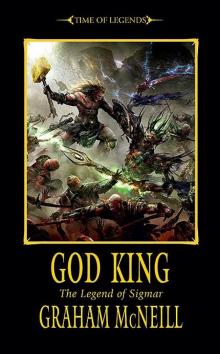 03 - God King
03 - God King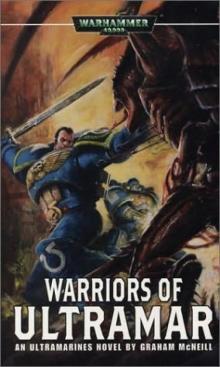 Warhammer - Ultramarines 02 - Warriors Of Ultramar (McNeill, Graham)
Warhammer - Ultramarines 02 - Warriors Of Ultramar (McNeill, Graham)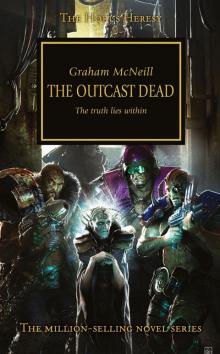 The Outcast Dead
The Outcast Dead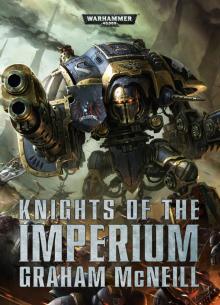 Knights of the Imperium
Knights of the Imperium Defenders of Ulthuan
Defenders of Ulthuan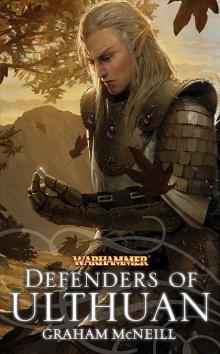 01 - Defenders of Ulthuan
01 - Defenders of Ulthuan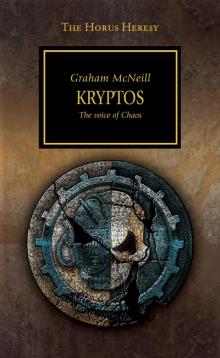 Kryptos
Kryptos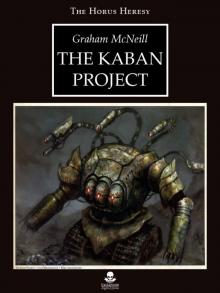 The Kaban Project
The Kaban Project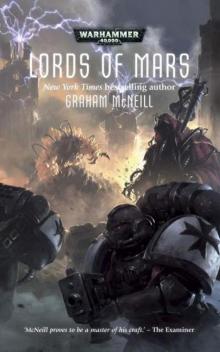 Lords of Mars
Lords of Mars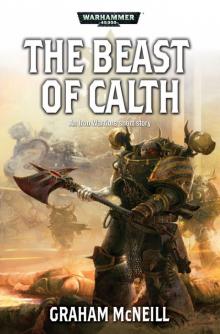 The Beast of Calth
The Beast of Calth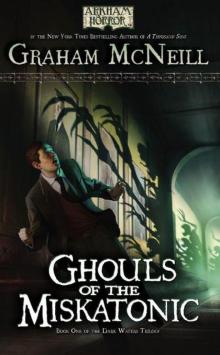 Ghouls of the Miskatonic (The Dark Waters Trilogy)
Ghouls of the Miskatonic (The Dark Waters Trilogy)![[Sigmar 01] - Heldenhammer Read online](http://i1.bookreadfree.com/i/03/24/[sigmar_01]_-_heldenhammer_preview.jpg) [Sigmar 01] - Heldenhammer
[Sigmar 01] - Heldenhammer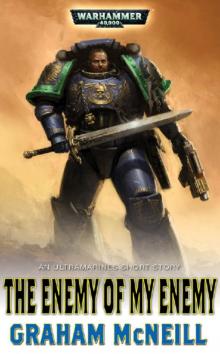 The Enemy Of My Enemy
The Enemy Of My Enemy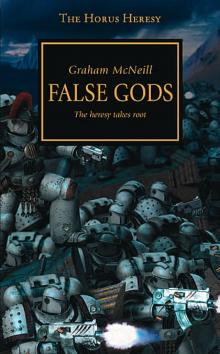 False Gods
False Gods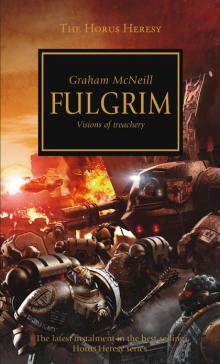 Fulgrim
Fulgrim Mechanicum whh-9
Mechanicum whh-9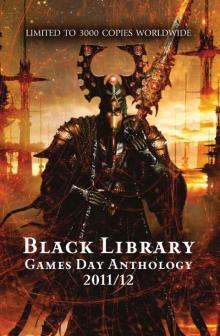 Death of a Silversmith
Death of a Silversmith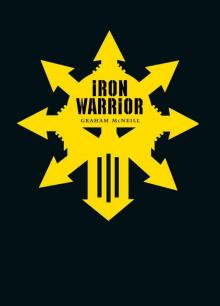 Iron Warrior
Iron Warrior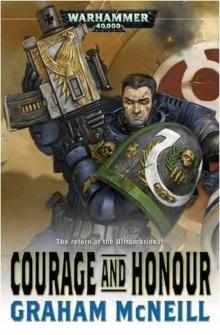 Courage and Honour w4u-5
Courage and Honour w4u-5![[Ultramarines 6] Chapters Due - Graham McNeill Read online](http://i1.bookreadfree.com/i1/03/30/[ultramarines_6]_chapters_due_-_graham_mcneill_preview.jpg) [Ultramarines 6] Chapters Due - Graham McNeill
[Ultramarines 6] Chapters Due - Graham McNeill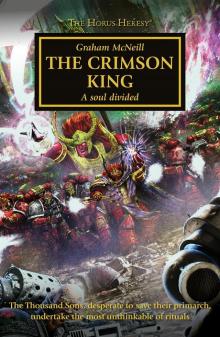 The Crimson King
The Crimson King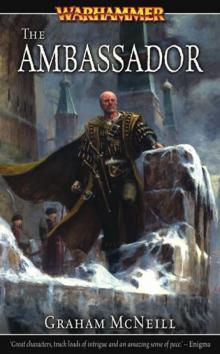 1 the ambassador
1 the ambassador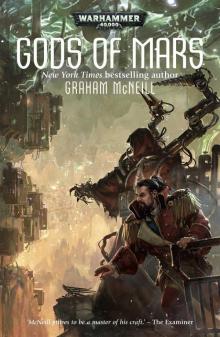 Gods of Mars
Gods of Mars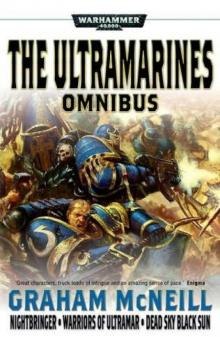 Ultramarines Omnibus (warhammer 40000: ultramarines)
Ultramarines Omnibus (warhammer 40000: ultramarines)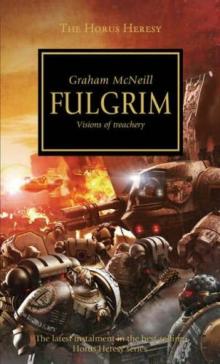 Fulgrim: Visions of Treachery whh-5
Fulgrim: Visions of Treachery whh-5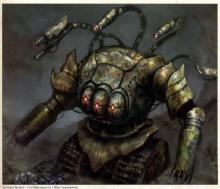 The Kaban Project (warhammer 40000: horus heresy)
The Kaban Project (warhammer 40000: horus heresy)![[Sigmar 02] - Empire Read online](http://i1.bookreadfree.com/i1/04/05/[sigmar_02]_-_empire_preview.jpg) [Sigmar 02] - Empire
[Sigmar 02] - Empire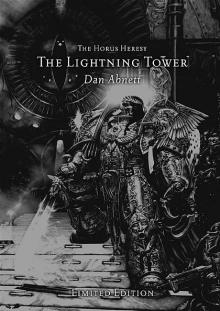 The Lightning Tower & The Dark King
The Lightning Tower & The Dark King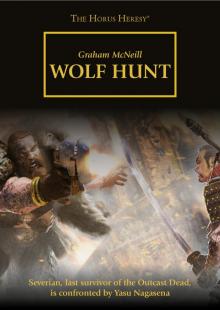 Wolf Hunt
Wolf Hunt Killing Ground w4u-4
Killing Ground w4u-4![Warhammer - [The Ambassador Chronicles 02] - Ursun's Teeth Read online](http://i1.bookreadfree.com/i1/04/05/warhammer_-_[the_ambassador_chronicles_02]_-_ursuns_teeth_preview.jpg) Warhammer - [The Ambassador Chronicles 02] - Ursun's Teeth
Warhammer - [The Ambassador Chronicles 02] - Ursun's Teeth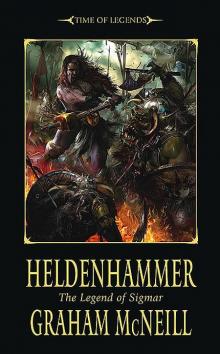 01 - Heldenhammer
01 - Heldenhammer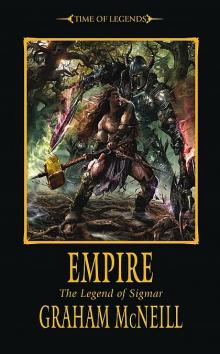 02 - Empire
02 - Empire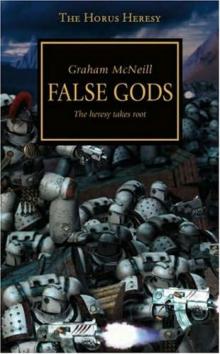 False Gods whh-2
False Gods whh-2